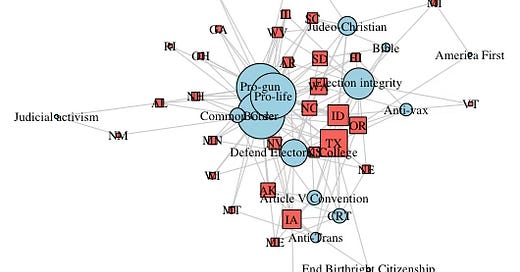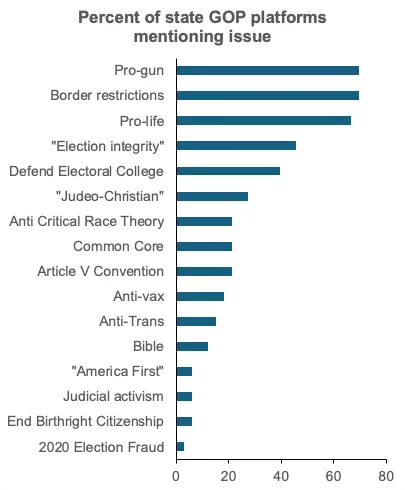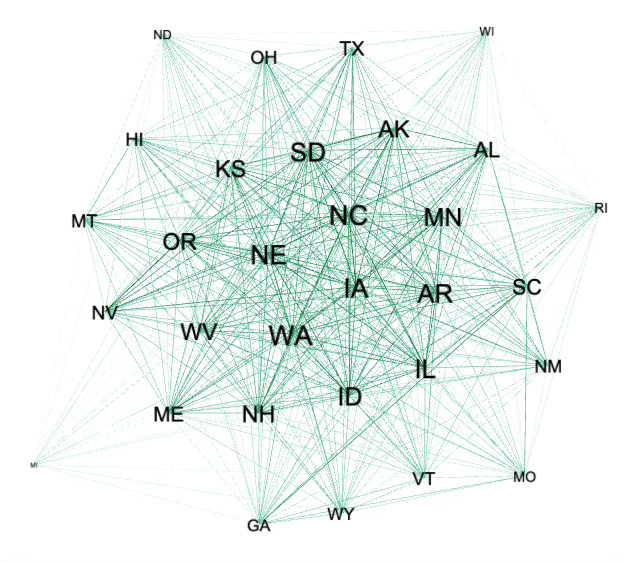The Republican State Party Network
A deeper dive into party platforms, with some raised eyebrows at Michigan
Last week I wrote a piece on changes in state Republican Party platforms across the country. I want to dig a big more into that here, with the help of some social network analysis images.
I have gathered 33 state Republican Party platforms (published since 2020) and gone through them to see which mentioned various common topics in Republican dialogue. Just to repeat the figure from the previous post, those topics are listed here, along with the percentage of state platforms that mention them:
In the figure below, I’ve mapped out the network of the state parties (in red squares) and the issues (in blue circles), and they’re joined together based on whether the platform mentioned that issue. (This figure is known as a two-mode or bipartite network plot — it has two different kinds of nodes in it.) The nodes are larger if they have more degree centrality (they’re connected to more other nodes). So, for example, the pro-life issue is one of the most frequently mentioned issues, and Texas’ GOP platform has the most of these issues in its lengthy platform, which is why those nodes appear the largest and are near the center of the graph. Conversely, “judicial activism” is kind of a fringe topic, only mentioned by two states, and is far from the center.
Here’s another way to examine these state parties. I calculated the “cosine similarity” of all the texts of the state party platforms. That’s just essentially taking the entirety of the texts and seeing how many terms any two given platforms have in common. Then I mapped out all the state GOPs shown by the strength of the commonality in their platforms. You can see that figure below. The state names are sized again by their centrality, with the more connected states in larger print. Darker lines indicate stronger correlations.
What this suggests is that a handful of states — North Carolina, Iowa, Nebraska, Washington, etc. — have Republican platforms that bear a lot of similar to each other. They cover a lot of the same ground. Wisconsin’s and Rhode Island’s Republican parties, seen at top right, are a bit in their own world, discussing more unique sets of issues. And perhaps the greatest oddball is Michigan, the tiny node at bottom left.
Why is Michigan’s GOP platform so strange? For one, it’s very short - one of the shortest in the country. It would fit easily on one page of printed text, just briefly mentioning a few issues. For another, it mentions issues in unusual ways. Note this statement in the section “Confronting the Culture”:
Unless we are willing to disrupt the cultural paradigm, we will lose elections. We must shift public perception about issues, the rejection of Judeo-Christian defined morality is destroying our society, creating chaos. This chaos will lead to the expansion of government. Being reactionary, puts us at the mercy of the Secularist collapsing society.
I’m not… totally sure I understand that, but okay.
But here’s a fun fact: the Michigan GOP platform is no longer on-line! The one I found and linked to above comes from a few months ago, available through the Internet Archive. (It was there when I first started this data collection, although I’m not sure why it got pulled.) Perhaps relatedly, Michigan’s GOP is one of the most troubled Republican Party organizations in the country right now. It has been riven by a civil war for several years pitting an “American First” wing overtly loyal to Donald Trump against a more conventional wing that rejects calls to overturn the 2020 presidential election.
Side note: Man, I wish the Colorado GOP had a more current platform, because it would be nice to have a window into what’s going on there right now.
Anyway, thanks for humoring me in my little social network analysis digression. I will be digging more into these platforms in the weeks and months ahead.
Thanks to Jennifer Nicoll Victor and Anand Sokhey for their advice on network analysis tools.








As a former Coloradan and blogger in 2010 on Colorado politics, I long ago wrote that for all practical purposes, there is no Colorado Republican Party.
Colorado is solid Blue because former leaders some 20 years ago got on the wrong side of abortion and other social issues.
Very good job, Seth!